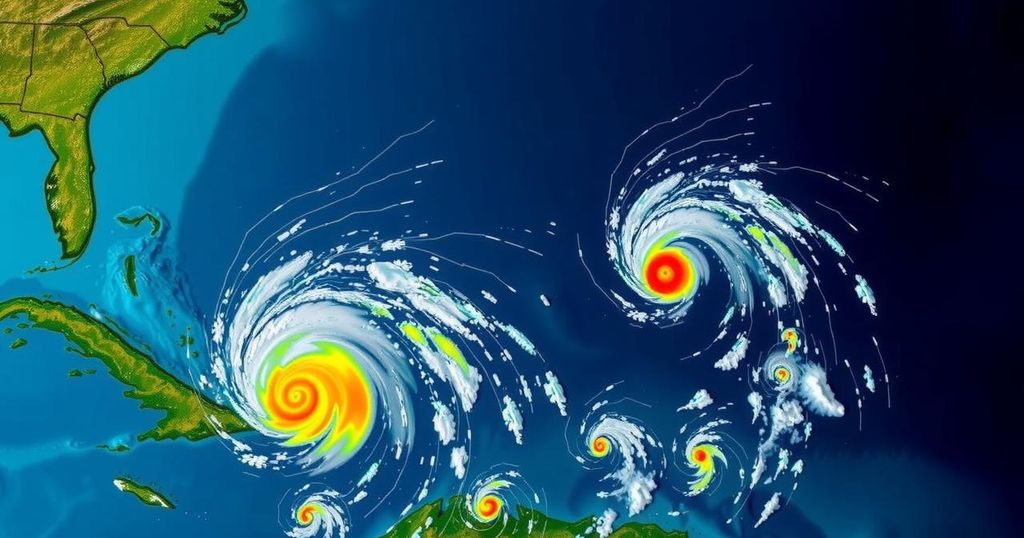2024 Atlantic Hurricane Season: A Year of Unpredictable Patterns and Intensified Storms
The 2024 Atlantic hurricane season has been active, yielding 18 named storms, 11 hurricanes, and 5 major hurricanes. After a strong start with Hurricane Beryl, mid-season saw a lull, followed by a resurgence with Hurricane Helene and Hurricane Milton. Climate change has been linked to increased storm intensity, highlighting the urgent need for improved disaster preparedness in impacted regions.
The 2024 Atlantic hurricane season is drawing to a close, marked by a total of 18 named tropical storms, including 11 that escalated to hurricane status, and five achieving major hurricane classification. A typical season yields approximately 14 storms, seven hurricanes, and three major hurricanes. Despite a notable number of storms, the season’s weather activity was unevenly distributed, with an unexpectedly quiet mid-season, contrasting with a vigorous start highlighted by Hurricane Beryl’s record-setting early formation.
Forecasters predicted an above-average season, with Hurricane Beryl making history as the earliest recorded category five hurricane on July 2. This powerful storm caused extensive damage and fatalities across the Caribbean and southern Texas, yet after its dissipation, the Atlantic experienced a lull with only four named storms until the end of September. Factors such as elevated ocean temperatures and the conclusion of a moderate El Niño were anticipated to contribute to a robust hurricane season. However, unanticipated changes in weather patterns in Africa may have limited storm formation, leading to a period of inactivity.
Following the earlier lull, the hurricane season revived in late September with Hurricane Helene, which rapidly intensified into a category four storm upon hitting the Florida coast. Helene, which was responsible for more than 150 deaths, marked the beginning of a series of storms where rapid intensification was observed. Hurricane Milton exemplified this phenomenon, recording a remarkable wind speed increase of 90 mph in just 24 hours, ultimately causing severe impacts including flooding and tornado outbreaks.
The last storm of the season, Tropical Storm Sara, did not develop into a hurricane but resulted in significant rainfall and flooding in Central America, underscoring the season’s impact across various regions. Analyses indicate that high sea temperatures, approximately 1°C above the 1991-2020 average, played a critical role in the intensity and frequency of storms this season, linking climate change to exacerbated hurricane conditions.
Investigations reveal that human-induced climate change has heightened maximum wind speeds across storms in 2024, particularly contributing to Hurricane Milton’s intensity. Although the frequency of tropical cyclones is not expected to increase significantly, those that do occur are likely to intensify more rapidly and deliver heavier rainfall, rendering them increasingly perilous for coastal and vulnerable communities.
The Atlantic hurricane season spans from June 1 to November 30, with peak activity typically occurring in early September. The seasonal forecasts and trends can significantly affect preparedness and response strategies for coastal populations. The interplay between ocean temperatures, atmospheric conditions, and climate change is critical in understanding storm behavior and intensity. Notably, climatic factors modifying the conditions for storm formation and trajectories have broader implications for disaster readiness and environmental policies.
In conclusion, the 2024 Atlantic hurricane season exhibited unusual patterns with a vigorous start, followed by an unexpected lull and a resurgence of storm activity toward the season’s end. Climate change appears to have intensified storm activity, resulting in stronger winds and elevated rainfall. As extreme weather events become more pronounced, the implications for coastal communities necessitate a reevaluation of preparedness and response frameworks to mitigate future disasters effectively.
Original Source: www.bbc.com




Post Comment